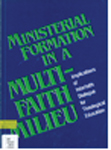Home » Resources » Scholarship on Teaching » Ministerial Formation in a Multifaith Milieu: Implications of Interfaith Dialogue for Theological Education
Scholarship
March 29, 2017
Ministerial Formation in a Multifaith Milieu: Implications of Interfaith Dialogue for Theological Education

- Author
- Amirtham, Sam and S. Wesley Ariarajah, eds.
- Publisher
- World Council of Churches, Geneva
It is generally accepted that theological education and ministerial formation must both take place "in context". The context, in most parts of the world today, is one of religious pluralism where Christians must live in dialogue and grow in commmunity with neighbours of other faiths. Ministers have a crucial role in shaping the attitudes of church people, especially in the area of interfaith relations. How may they be equipped to play this positive role? What, in other words, are the implications of interfaith dialogue for theological education?
That was the question discussed by a group of theological teachers when they met in Malaysia in June 1985, called together by the World Council of Churches' Programme on Theological Education (PTE) and the Dialogue Sub-unit. Ministerial Formation in a Multifaith Milieu presents an informal report of that meeting. (From the Publisher)
That was the question discussed by a group of theological teachers when they met in Malaysia in June 1985, called together by the World Council of Churches' Programme on Theological Education (PTE) and the Dialogue Sub-unit. Ministerial Formation in a Multifaith Milieu presents an informal report of that meeting. (From the Publisher)